23 Scary Signs Your Home Is a Fire Risk
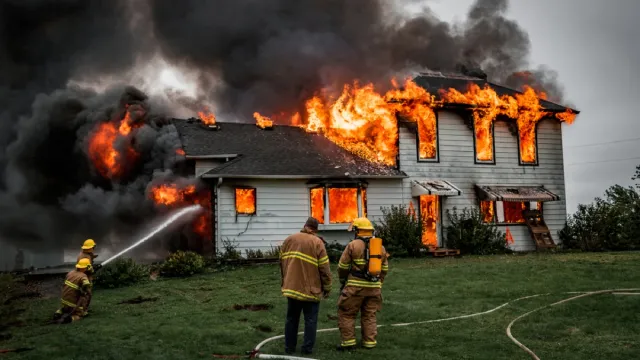
It’s every person’s worst nightmare to be awoken in the middle of the night by the smell of smoke. And unfortunately, this scenario is all too common: According to the National Fire Protection Association (NFPA), there were approximately 355,400 home fires between 2012 and 2016 alone, which caused $6.5 billion in property damage, 11,670 injuries, and 2,560 deaths. While regularly testing your smoke detectors, having fire extinguishers handy, and not smoking can all reduce your risk of a structure fire, there are many surprising factors that can contribute to a fire in your home that you probably don’t know about. Read on to discover what top fire safety professionals want you to know to stay safe.
1
You live in a newer home.

As counterintuitive as it might sound, living in a new build actually increases your home’s fire risk factor. Plus, if you live in a more modern home and it does catch fire, it’s also more likely to spread faster.
“A newer home is going to burn four times faster than older building construction and older homes would,” says Tom Hart, a firefighter in the Yonkers Fire Department in New York and a safety engineer at international engineering firm Syska Hennessy. That’s because of flammable plastics and newer wood that builders use today. “The coating and finish on modern wood burns much quicker and is much more likely to burn through,” Hart says.
2
You have leaks in your plumbing.

Though water is generally thought of as fire’s mortal enemy, the liquid can also be the cause of a house fire if you’re not careful. “If you have water leaking in through the structure and it happens to come into contact with electrical wires, electrical boxes, or electrical outlets, you could have a short,” says Chuck Roydhouse, a retired professional firefighter and president of the Chimney Safety Institute of America (CSIA). At the first sign of water damage, it pays to call a plumber as well as an electrician, or that short could cause a fire inside your wall.
3
Your paint is peeling.

Though most people associate peeling paint with lead contamination or moisture issues, it can also be a sign of a potential fire hazard. If you notice paint peeling “around the pipe venting a furnace, boiler, or wood stove, or on the area above your fireplace opening,” there may be an electrical element that’s overheating behind the wall, according to Roydhouse. He notes that cracking wall paneling or discolored sheetrock can also be signs of the same issue.
4
You keep your lawnmower in the basement.
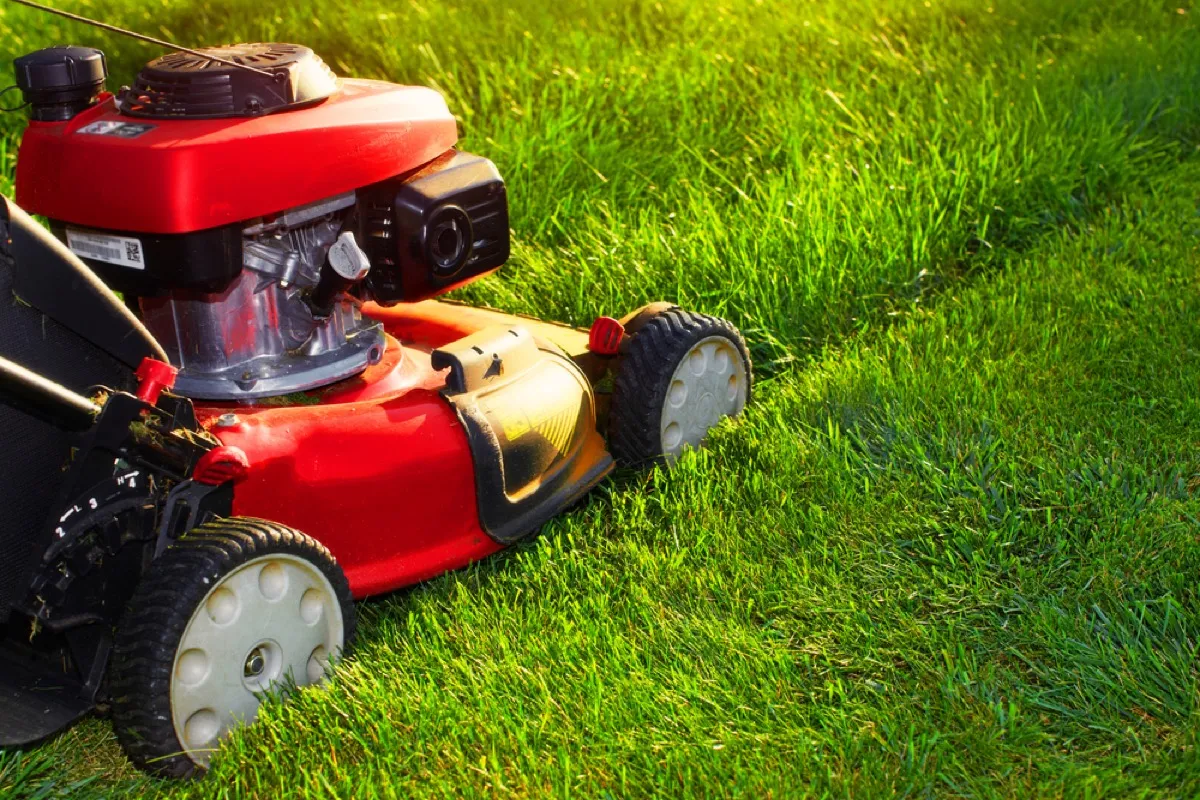
If you don’t have an outbuilding on your property, it’s likely you store your gas-powered lawnmower in your basement to keep it away from the elements. But doing so could be a major fire risk.
According to Roydhouse, gas-powdered equipment can overheat indoors and “find an ignition source,” thus starting a fire. His advice is to “make sure you keep [your lawnmower] stored away from the home in some type of shed or other closed environment.”
5
You live in a cluttered space.
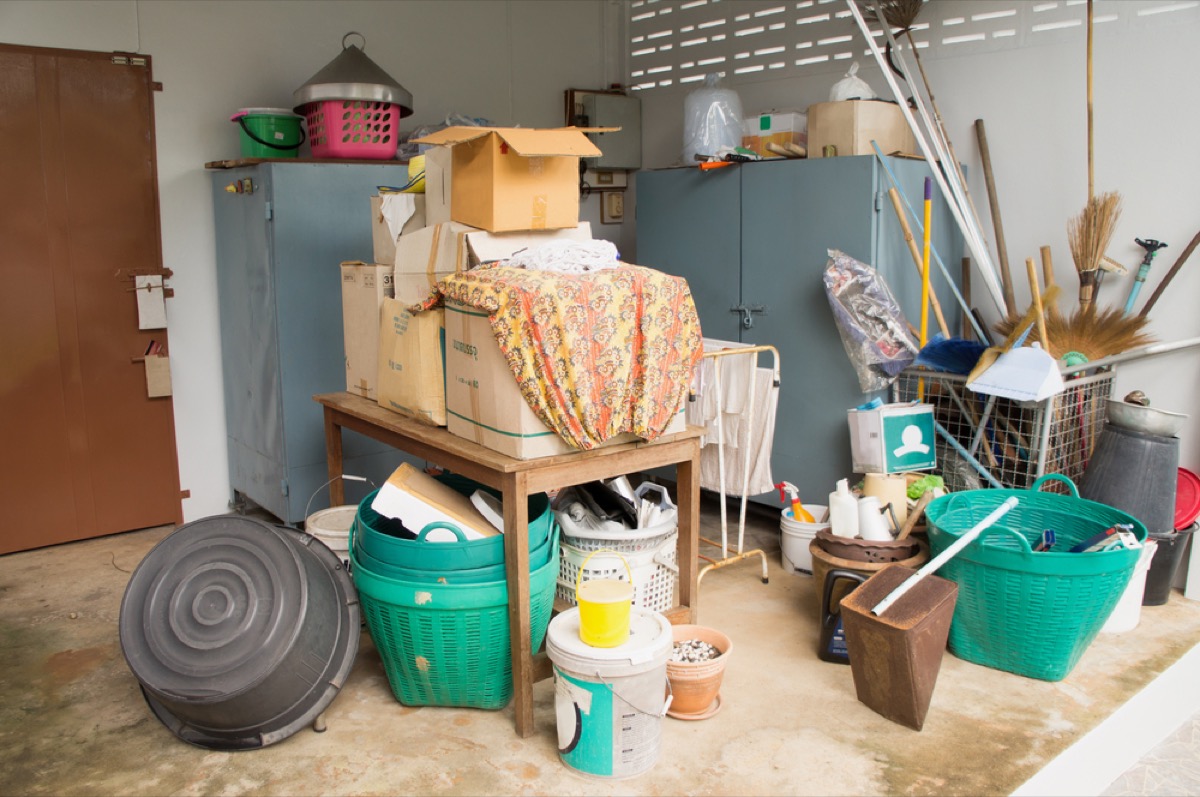
Nobody can be expected to keep their house neat and organized 24/7, but if you have lots of clutter in your home consistently, you’re inadvertently putting yourself in harm’s way. According to Hart, storage rooms and basements stacked with boxes near electrical panels are often a source of fast-moving (and difficult-to-contain) fires.
6
You have a mouse problem.
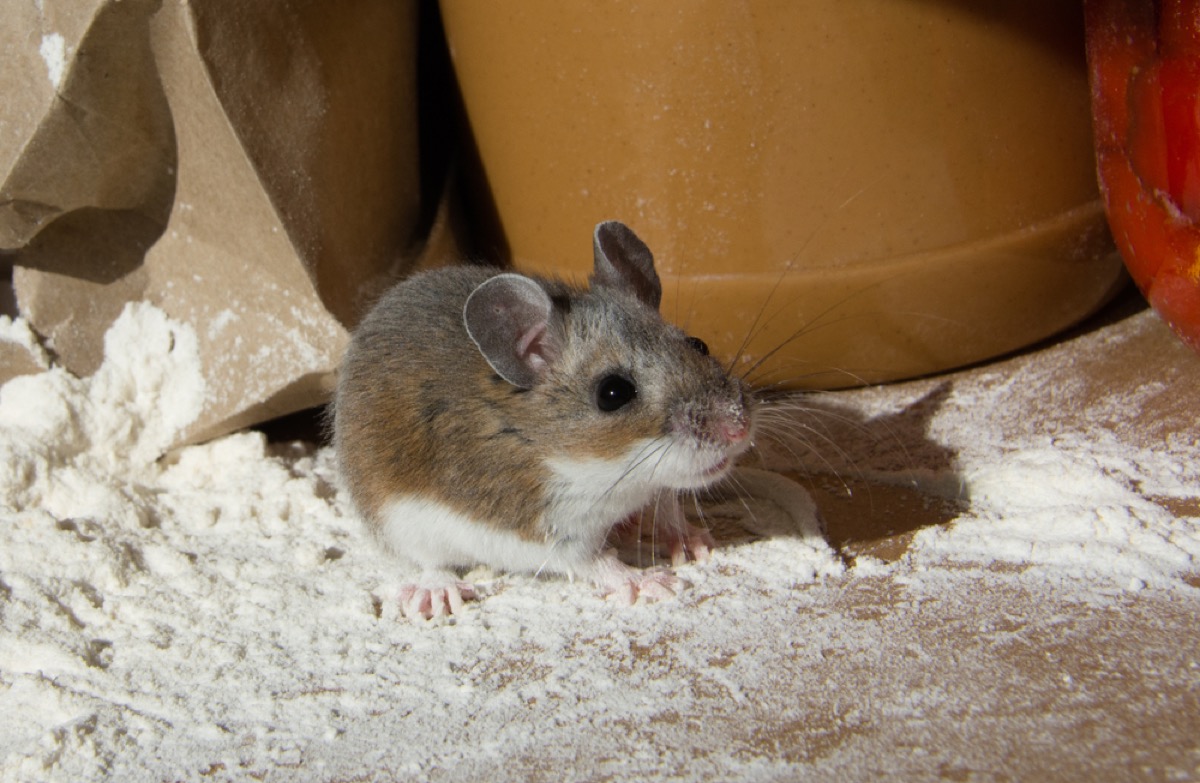
Finding that someone other than you is snacking on the food in your pantry isn’t the only downside about having mice. As Hart notes, wires that have been chewed through by rodents are “a common source of electrical fires.” The good news? Not only are signs of a mouse infestation pretty obvious, but electrical fires have a characteristic burning smell that’s easy to spot before there are any actual flames. So, if you smell something burning and can’t locate its source, it’s best to call 911 before things get out of hand.
7
You don’t dust your electronics regularly.
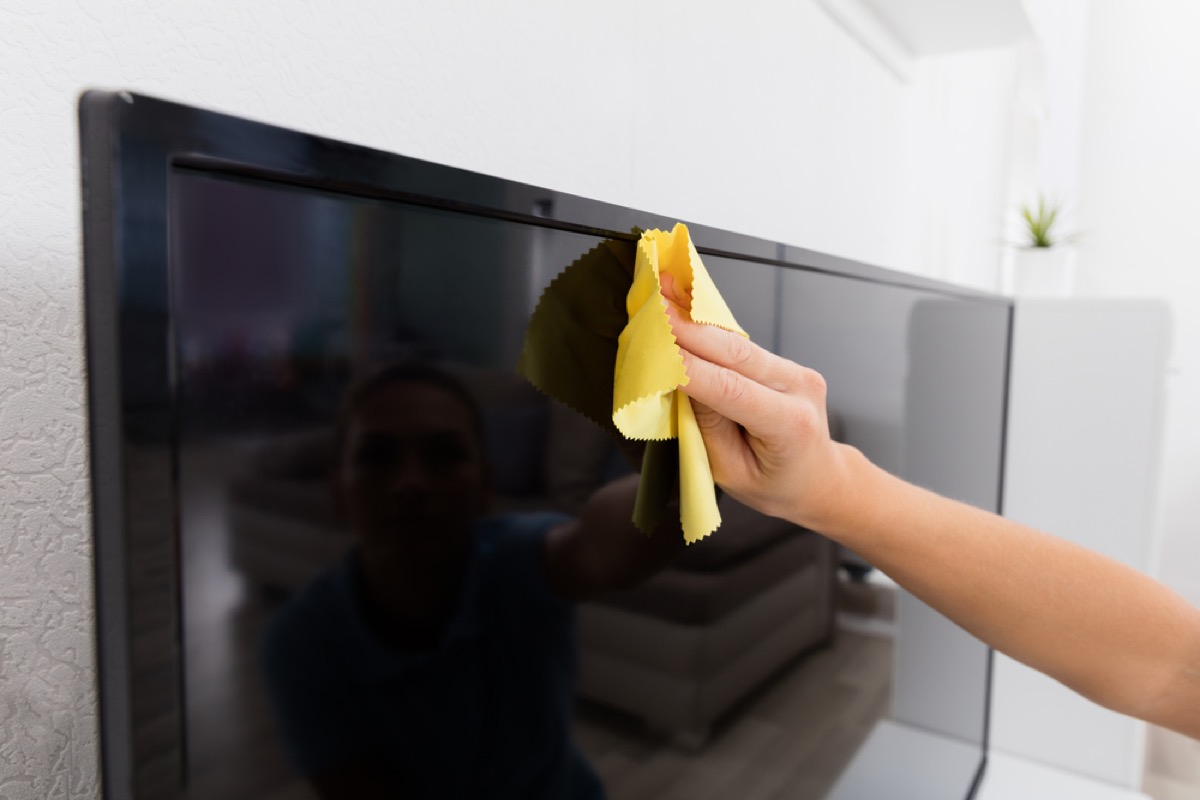
Dusting may be a thankless job, but failing to keep those electronics clean can present a bigger risk to your safety than you might imagine. “Dust is flammable,” says Hart. And it makes appliances more likely to overheat. Once an appliance sparks, that dust can ignite, leading to a fast-spreading fire that’s hard to put out.
8
You stack laundry on your dryer.

Think leaving piles of folded laundry atop your dryer before you put them away is no big deal? Think again. Hart cites dryers piled with laundry as one of the surprisingly common source of home fires. And unfortunately, that’s not the only fire risk associated with your dryer.
Even if you think you’re adept at cleaning this appliance, you might still want to give it another pass. That occasional wipe-down of your lint trap just won’t cut it. “Gas dryers need to be cleaned inside and out, around, and behind,” Hart says.
9
You decorate with hay in the fall.
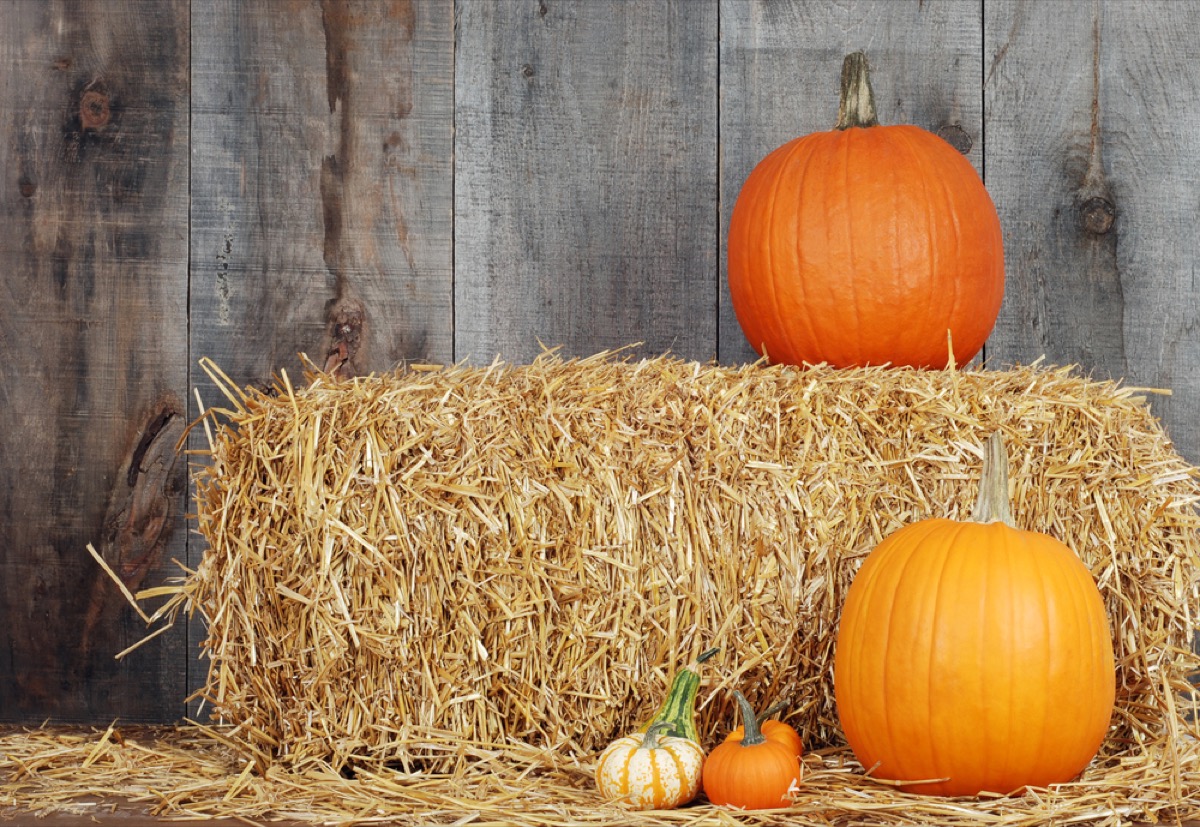
Decorative hay bales—or if you have a farm, the ones you use to feed your livestock—can present a surprising fire risk if they’re stored close to your home. “Hay does spontaneously combust,” says Hart. Even more surprising is that “wet hay is actually more likely to combust” than the dry stuff, due to different moisture levels within the bales.
10
And you don’t clean your yard when the leaves start to fall.

Doing a fall cleanup of dead leaves and vegetation isn’t just good for your plants. It’s also essential for your safety. According to Roydhouse, mowing your lawn and removing leaves ensures that you “don’t have a lot of standing dead brush or dead plants, which are very combustible.”
11
You leave extension cords outside all summer.

Keeping your sprinkler plugged into an extension cord may keep the outdoor fun going all summer long, but it can also spark a fire in your home. Roydhouse notes that the insulation protecting extension cords can be easily broken down by foot traffic or sunlight, potentially leading to an electrical fire over time.
12
Or you run them near evergreen trees.

You probably know not to run your outdoor extension cords through water or dry vegetation, but did you know that running them next to evergreen trees can be dangerous, too? “They’re loaded with oils and they burn very, very fast even though they’re totally green,” explains Roydhouse.
13
Or you run them under rugs.
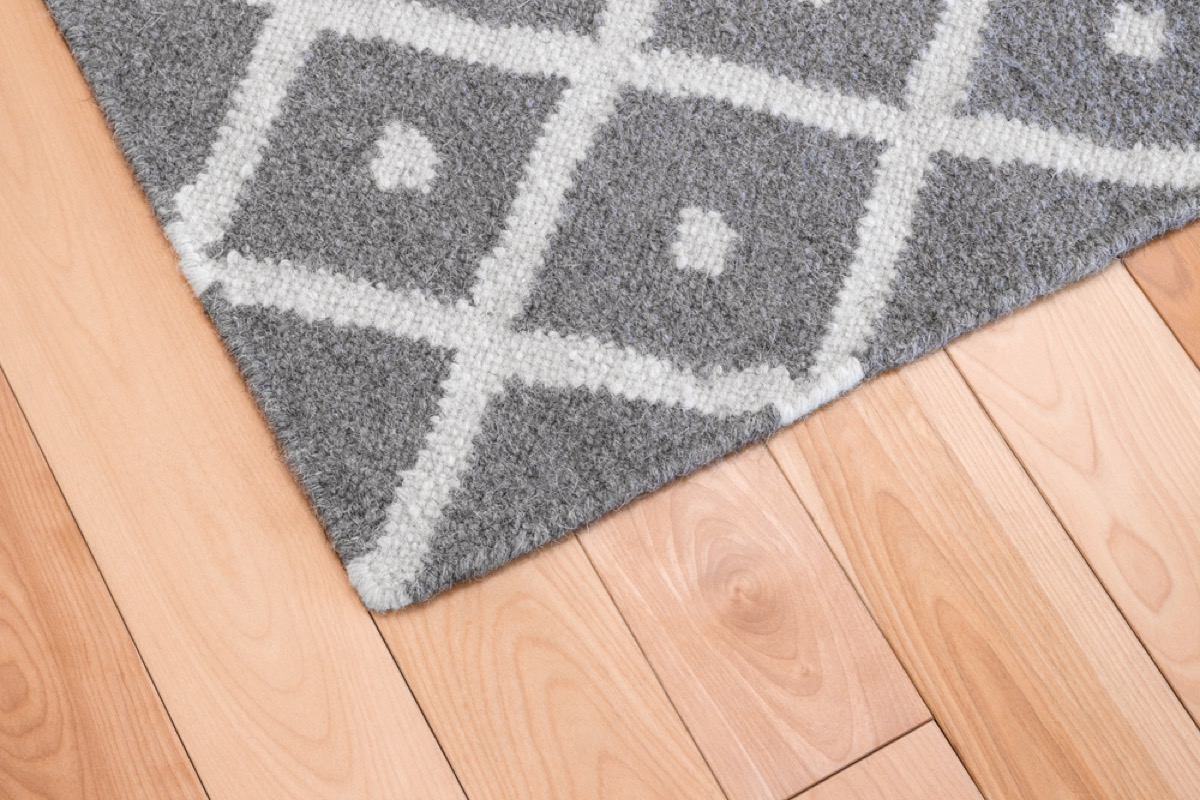
While extension cords may be unsightly, trying to hide them under rugs is a serious fire risk. “Running them under carpet will just add to heat buildup and they will catch fire eventually—it’s only a matter of time,” says Hart.
14
You hang your drapes over a radiator.

Those flowing drapes hiding your unsightly radiator are also putting you in harm’s way. “Synthetic materials that drapes are made of are more likely to catch,” says Hart. And unfortunately, these fires tend to get out of control quickly because of how fast they spread. While you might smell an appliance overheating in time to turn it off, when a floor-to-ceiling curtain catches fire, it can engulf an entire room in mere seconds.
16
Or you have long curtains in the kitchen.

Yep, the long curtains in your kitchen aren’t much better when it comes to fire safety. When they catch a breeze from an open window, they can easily “come into contact with cook tops or any other electrical appliances you may have in the kitchen,” says Roydhouse.
16
Your furnace hasn’t been serviced in a while.
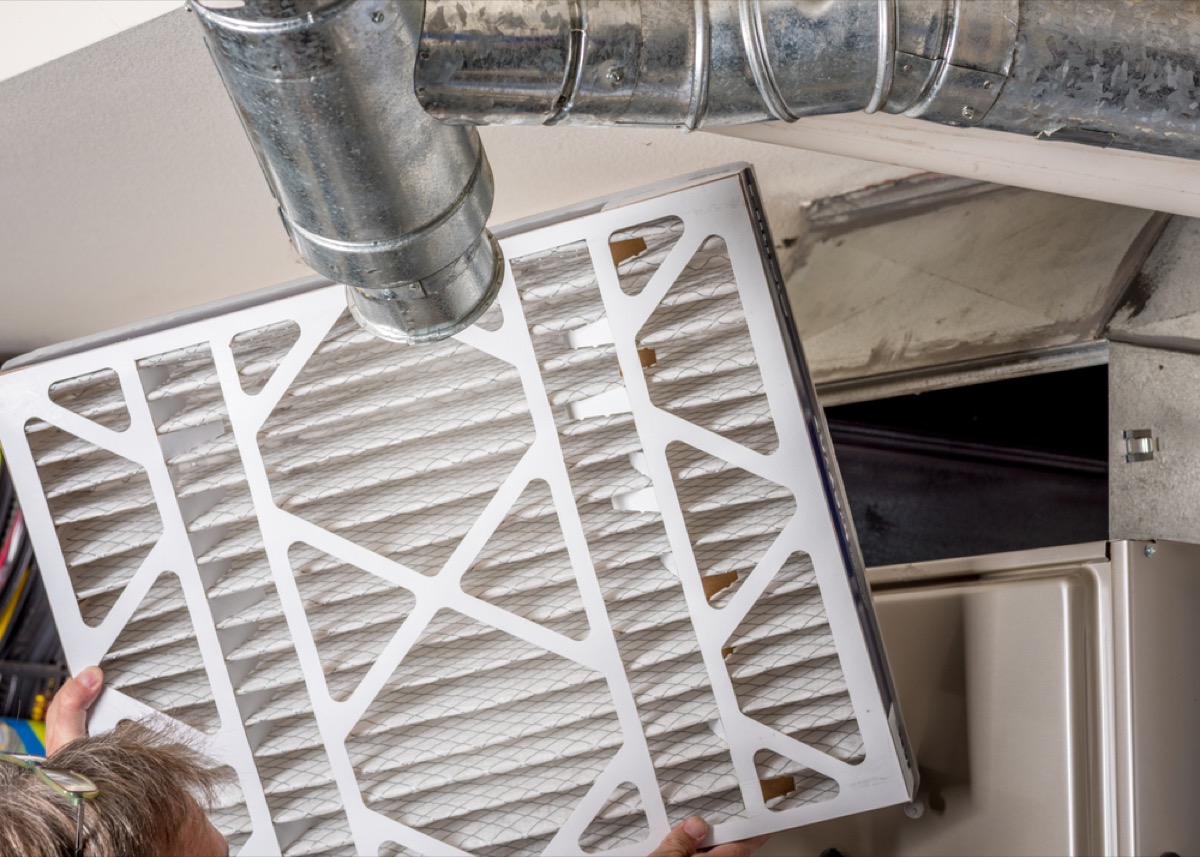
While it may seem like stoves and space heaters are the appliances most likely to set your home ablaze, Hart says that “the number one appliance related to fires is furnaces.” And unfortunately, it’s not just faulty furnace wiring that can cause problems. “If they’re older or full of dust, sometimes those heaters will combust,” notes Hart, who says this can cause a fire in the home’s ductwork.
17
You use the drawer under your stove for storage.
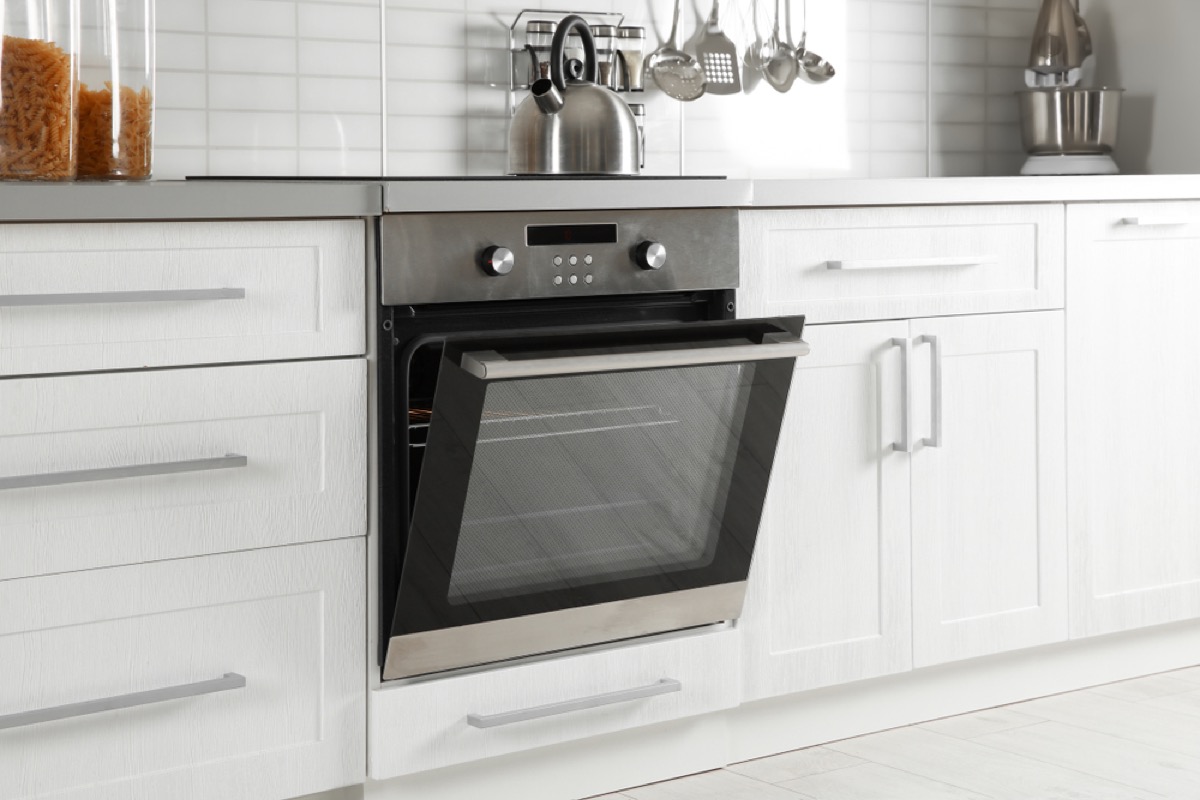
That drawer under your stove has a purpose—and cutting board storage isn’t it. In fact, using that warming drawer to stow miscellaneous items could be the very thing that ends up burning your house down.
Accidentally turning on the broiler drawer while things are in it puts you at risk of a serious fire. And if the things you’ve been storing in your stove do ignite, Hart recommends leaving the stove closed, turning it off, unplugging it if possible, and calling 911.
18
You have more than one major appliance plugged into the same power strip.
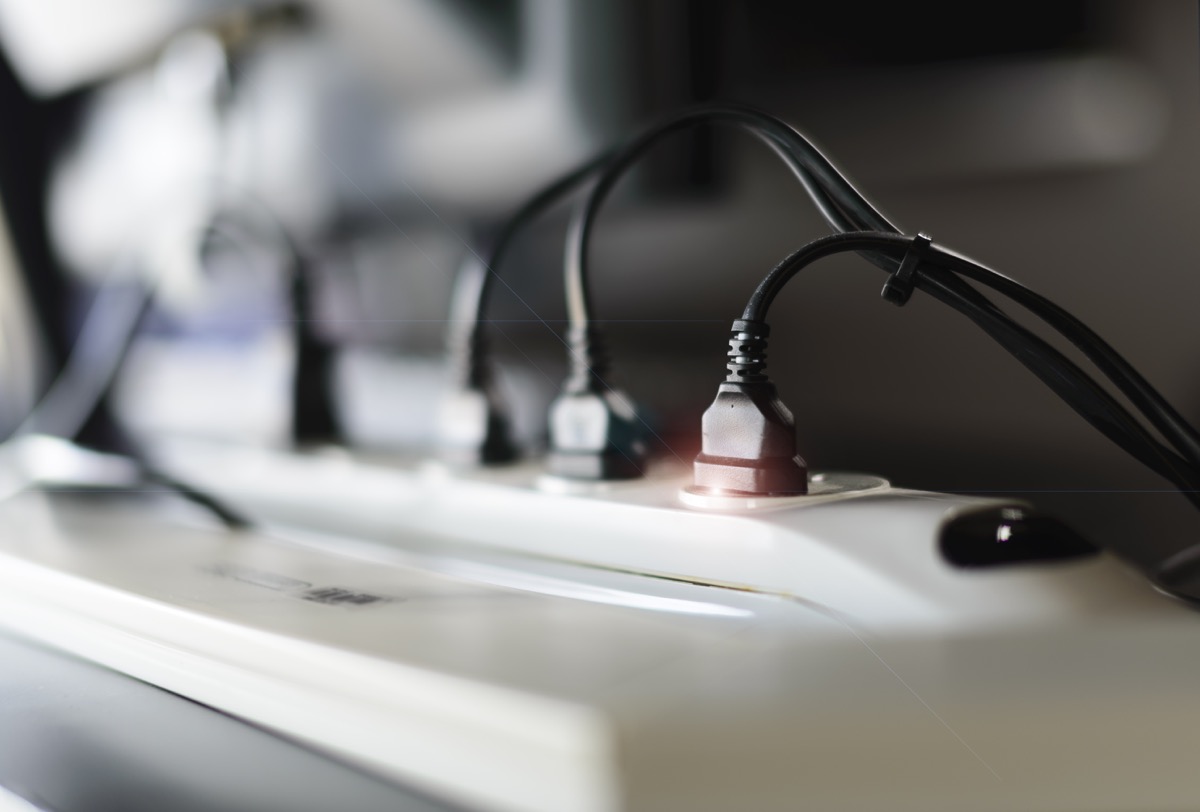
While power strips can be helpful when you have more electronics than you do outlet space, they’re only supposed to be used as “temporary devices,” cautions Hart. “Even when you don’t think it’s overloaded, it probably is.”
He warns that even two computers plugged into a single power strip can be enough to cause a short and a fire as a result. “If you need more power in a certain room in your house, you need an electrician, not more extension cords or power strips,” Hart advises.
19
You buy battery-powered toys on sketchy websites.

That must-have battery-powered toy that everyone’s been raving about may seem cool, but if it’s not from a reputable company, it’s unlikely to have undergone the necessary testing to ensure that it’s safe. “Faulty batteries are the biggest cause of hoverboard explosions,” says Hart. He also points out that home-assembled electric bikes can be a surprising fire source, as “these companies aren’t really regulated yet.”
20
You don’t pay attention to the wattage of your light bulbs.
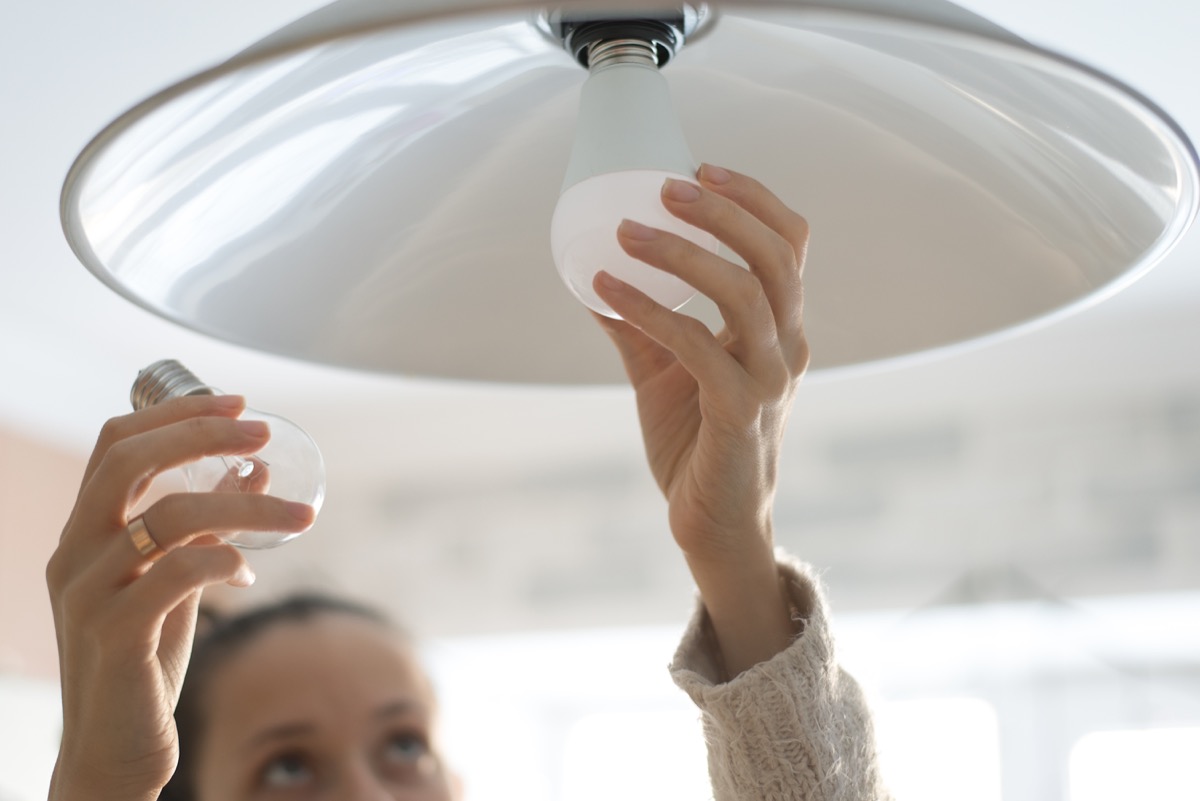
“Always use the correct manufacturer listing for a light bulb,” says Hart. “Higher wattage light bulbs are more likely to lead to overheating and, eventually, fire.”
21
You don’t have dedicated storage for your hot hair tools.

Sure, you may have turned off that flat iron, but that doesn’t mean you’re necessarily playing it safe. In addition to being a frequent cause of electrical shorts, Hart says that leaving a hot tool on a plastic or wood surface—even if it’s turned off or unplugged—has the potential to start a fire. His suggestions? “Always use it in the same place and make sure it’s left somewhere safe to cool off,” like a wire storage rack, stone counter, or inside a heat-proof silicone sleeve.
22
You haven’t upgraded your electric service in a long time.
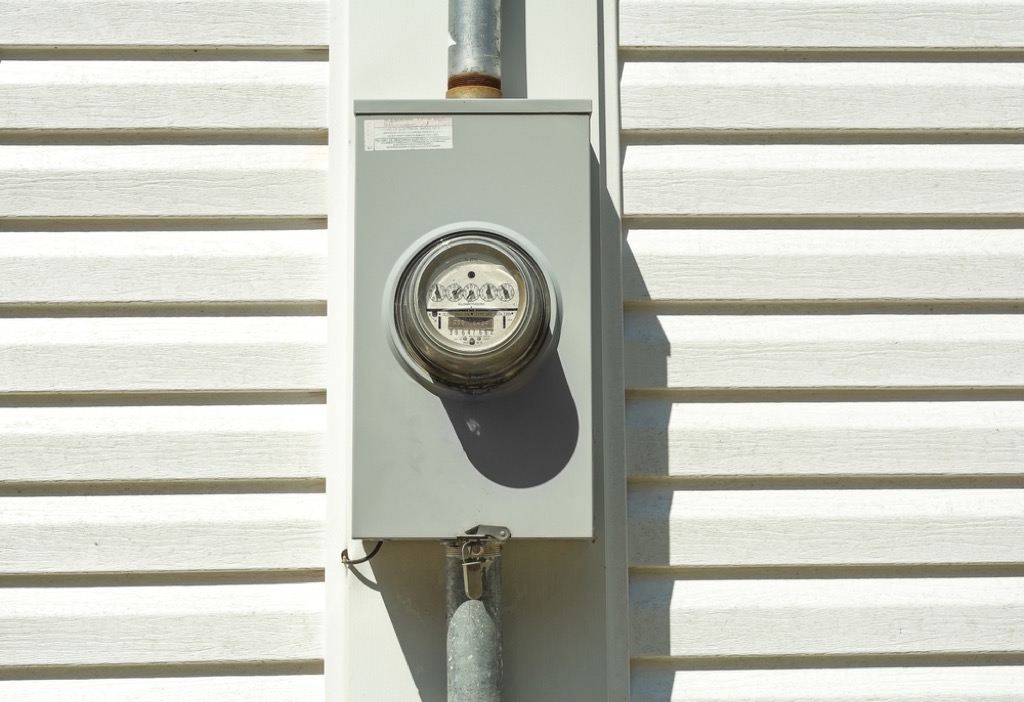
Your fuses never trip and your lights don’t flicker, so your risk of an electrical fire is practically nil, right? Unfortunately, that’s not necessarily the case. If you haven’t upgraded your home’s electrical panel in years, it’s likely you’re overloading it.
According to Hart, one common recipe for disaster is “newer appliances that draw more electricity plugged into an older electrical power [source].” Not only will the entire electrical panel burn out and catch fire, but those flames can ride up the side of your house and cause multi-story damage.
23
You let your kids cook by themselves.

Is it nice to imagine the day when your little ones can prepare meals for themselves—or you!—without supervision? Of course! However, that culinary independence shouldn’t start too soon. “In general with cooking, [if you’re] under 14, you should be watched by a parent,” says Hart. And for more helpful home tips, here are 21 Ways You’re Damaging Your Home, According to Your Handyman.
To discover more amazing secrets about living your best life, click here to follow us on Instagram!